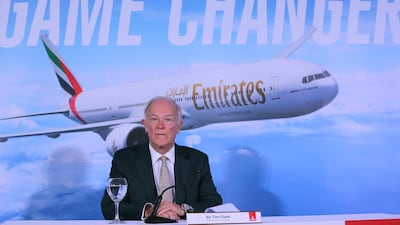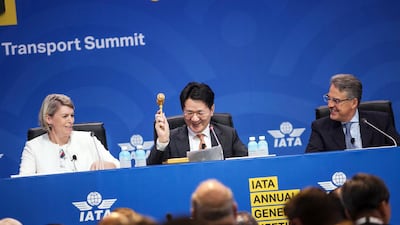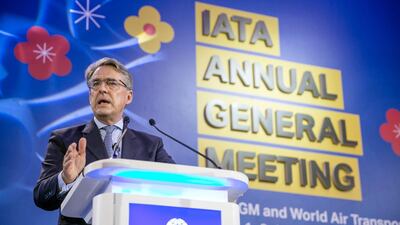Emirates airline president Tim Clark said the Boeing 737 Max would probably remain grounded until December because of a lack of co-ordinated action between global aviation regulators.
“I don’t believe the plane is likely to fly for the next few months simply because there’s a difference in opinion among the regulators who control the operation,” Mr Clark said on Sunday.
He was at the 75th International Air Transport Association annual meeting in Seoul.
The estimate by Emirates, whose sister budget carrier Flydubai is the world’s second-largest Max customer, is more conservative than Iata’s expectations that the aircraft will probably stay grounded until August.
Emirates joined a growing number of global airlines expressing concerns about a fragmented response by regulators on the measures and timeline to return the Max into commercial service.
The 737 Max, Boeing’s best-selling aircraft, was grounded in March after two fatal crashes within five months in Ethiopia and Indonesia, which killed 346 people.
Emirates does not operate the Max but is in a partnership with Flydubai, which has 14 grounded jets and dozens more on order.
Boeing must work with regulators to satisfy their requirements rather than resist delays to get the plane in the air, Mr Clark said.
“They must work with regulators and ensure the regulators are satisfied, because it’s done enormous damage to the industry and they have a responsibility to make that good,” he said.
Close collaboration between aviation authorities around the world on the Max is essential, Iata said.
“Any rift between regulators is not in anybody’s interest,” said Alexandre de Juniac, the association's director general.
Mr Clark also said regulators were likely to take a stricter view of the 777X widebody, Boeing’s next plane, which is expected to enter commercial service in 2020.
Emirates is the launch customer of the aircraft which, like the Max, is an upgrade of an existing model.
The airline is finalising a review of its route network after the demise of its A380 flagship plane, and said the Boeing 787 featured in its fleet strategy. It confirmed it was planning to take the Dreamliner model.
The airline had ordered the Dreamliner in November 2017 but had not converted it into a firm contract.
“We’ve got a lot of work to do but we’re not far away,” Mr Clark said.
This year Emirates said it signed a new deal with Airbus for 40 A330-900s and 30 A350-900s worth $21.4 billion (Dh78.5bn).
“When we get the new twins, the A330s, A350s and hopefully the 787s, the network will take on a different form,” Mr Clark said.
Emirates could use these jets to serve demand in smaller cities, he said. Destinations could include second or third-tier cities in Africa, the US, Asia and South America.
At the Dubai Airshow in November, Emirates expects to firm up some orders, he said.
Asked if that would include firming the 787 order, he said: “We’re looking at all of that. We still have work to do.
"I’m a great 787 fan. It definitely fits into our network. But equally the A330 and A350 do, so could we have all three working together? Yes, it's possible.”
Mr Clark said the US-China trade wars could have an effect on demand for trans-Pacific and, to some extent, routes between Europe and Asia routes.
Emirates expects a “very robust” summer with flights already full, but autumn could be “trickier”, he said.
The airline, which had a 45-day closure of one of two runways at its base of Dubai International Airport, said the financial hit was not as bad as it had planned thanks to the Easter holidays.
“We’re ahead of the losses we were going to make,” he said. “We made losses, of course we did, it is 46 aircraft on the ground for six weeks.
"They weren’t as bad as we thought. April, May, June will be better than we thought it would be.”







